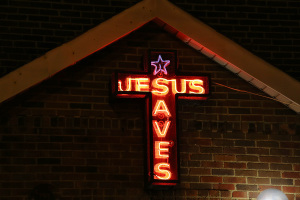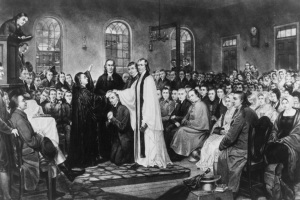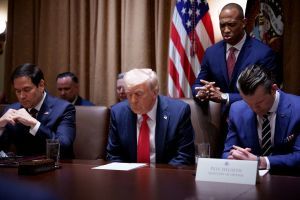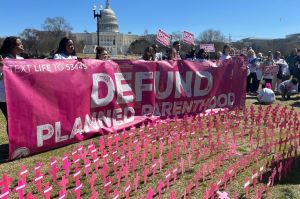'Threat to democracy' or media phantom? Christian nationalism debate takes violent turn
Evangelicals wrestle with language, political agendas, potential 'fusion of Christianity and the state'
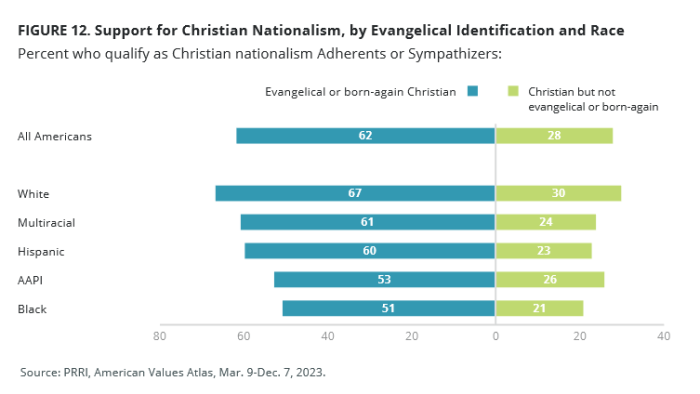
The demographics of Christian nationalism
Despite MSNBC and other networks’ claims that Christian nationalism is a distinctly white Evangelical phenomenon, a February study by the Public Religion Research Institute found majorities of two religious groups hold Christian nationalist beliefs: white Evangelical Protestants (66%) and Hispanic Protestants (55%).
For its metric of Christian nationalism, PRRI used a battery of five questions about the relationship between Christianity, American identity, and the U.S. government and asked respondents whether they completely agree, mostly agree, mostly disagree or completely disagree with each of the following statements:
- “The U.S. government should declare America a Christian nation;”
- “U.S. laws should be based on Christian values;”
- “If the U.S. moves away from our Christian foundations, we will not have a country anymore;”
- “Being Christian is an important part of being truly American;” and
- “God has called Christians to exercise dominion over all areas of American society.”
The survey found “little variation in support for Christian nationalist beliefs by race or ethnicity alone,” with roughly three in 10 white Americans (20% sympathizers, 10% adherents), black Americans (21% sympathizers, 12% adherents), Hispanic Americans (20% sympathizers, 9% adherents) and multiracial Americans (19% sympathizers, 8% adherents) qualifying as Christian nationalists.
What does Christian nationalism mean?
Some may be surprised to learn that, as a matter of discourse, there is no true consensus on what the term Christian nationalism actually means, according to Mike Berry, executive director of the Center for Litigation at America First Policy Institute.
According to Berry, there is no legal definition of Christian nationalism.
“And even if there were a legal definition, I think the term has really taken on a life of its own. It's been used, if you want to say it's been weaponized, I think, by the Left, as a bit of a dog whistle,” said Berry. “Look, the United States, everybody agrees that the United States is not a theocracy. Anyone who studied the founding of our nation knows that we were really, it was a marvel of the world at the time, the way that our founders established our republic.
“We have a democratic republic, and the power resides in we, the people. So it's not a monarchy; it's not a theocracy. And so, like I said, when people use the term Christian nationalism, I'm not even sure exactly what they mean.”
Berry says while there’s no denying the U.S. was “founded on Christian principles,” the controversy stems from the intention behind the phrase.
“If you use the term Christian nationalism to mean that the United States is a theocracy or should be a theocracy, I think you'd find very, very little support for that,” he said. “Even among those who would describe themselves and identify themselves as people of faith.
“We love America precisely because it's not a theocracy and we have the freedom to freely exercise our religious beliefs, even if those beliefs are different from the mainstream.”
Others, like James Spencer, author and theologian with the D.L. Moody Center, say defining such a broad term will, by necessity, require nuance and precision, particularly for what he calls the “different species of Christian nationalism.”
“One of the ways that I've tried to differentiate this is Christian nationalism that I view as problematic and theologically problematic for the Church, particularly, is Christian nationalism that seeks to fuse Christianity with the State,” Spencer said.
“There is a desire for Christians to actually run the government, not just participate in government. We're not talking about folks running for office or voting or anything like that. But for Christianity to be the reigning philosophical and theological framework through which the State is then operated. That, to me, is Christian nationalism. It's that fusion of Christianity and the state.”
And that objective, added Spencer, simply isn’t found in the Bible.
“When we look at Scripture, we see a distinction between the Church and the State. We see that God has established the Church, and we also see that God has delegated authority to governing authorities, which in our context is the state and federal governments,” he explained. “The Church is not set up to operate as the State.
He said the Church is not "set up to exercise the State's political power."
"It is to be a people apart, demonstrating and witnessing to Jesus Christ, and offering, obviously, theological critique of the State and its operations," he said. "But ultimately, we are not set up to reign. We're not set up to rule. We are here to serve God. We are here to point to and magnify Jesus Christ."
“And so, I think that collapsing the distinction between the Church or Christianity and the State is biblically problematic.”
Ian M. Giatti is a reporter for The Christian Post. His latest book, THE ASSEMBLY ON THE ROCK, is set for release Sept. 2024. He can be reached at: ian.giatti@christianpost.com.
















